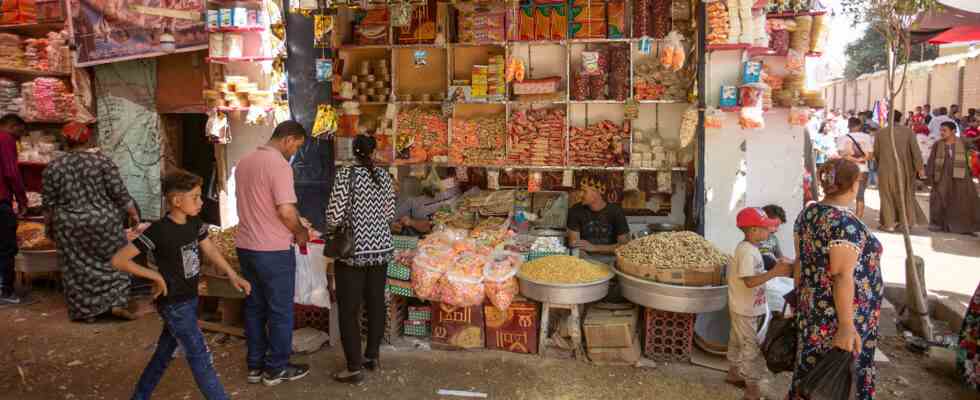Status: 04.01.2023 06:35 a.m
Egypt’s President Al-Sisi is attempting to add glamor to his authoritarian rule with major projects. At the same time, the economic hardship in the country is increasing. Is al-Sisi bankrupting his country?
Shortly after the sun comes up, the first customers come to the Ful-Karren, a wooden food stand on wheels. Beans, onions, oil and bread: Ful is a calorie-packed Egyptian breakfast classic, popular with people who have to work hard and don’t have a lot of money.
It’s people like Ashraf Hamam, who toils away crates here in central Cairo and is becoming increasingly concerned. “I’ve never been rich, but I used to be able to afford Ful every day,” he says. In recent months, however, the prices of the dish have more than doubled, and at some stands even tripled. “Now I can often only eat cheap biscuits for breakfast, no more Ful.”
There is no shortage of goods in the shops. But fewer and fewer Egyptians can afford everyday things.
Image: picture alliance/dpa
Criticism is getting louder
A poor man’s meal that many poor people can no longer afford. Anyone wondering how bad the economic situation is in the most populous country in the Arab world will get the answer at the Ful stands in the form of a desperate question: “How are we supposed to pay for it?”
More and more people are also venting their frustration at clothing markets, at minibus stops and even on social media. The latter is remarkable insofar as one has to be careful in Egypt, and even face a prison sentence, if one communicates something on the Internet that can be interpreted as criticism of the powerful. In the meantime, however, the population is audibly bubbling. This crisis has already become too big and destructive.
There is also a currency crisis
The economic crisis is also a currency crisis. Goods have been stuck in Egyptian ports for months because importers cannot pay their bills. The country on the Nile lacks foreign exchange after a lot of international capital left the country in the wake of the corona pandemic and the war in Ukraine.
In the eyes of numerous observers, sharp increases in interest rates worldwide are now even making the prospect of national bankruptcy more likely again. “It’s a classic,” says economist Wael Gamal. “Exactly the same thing” happened to many developing countries in the 1980s, when low interest rates were quickly replaced by high interest rates. “The result was payment defaults.”
The world is watching Egypt – President al-Sisi liked the role of hosting the world climate conference last November. But the domestic problems are enormous.
Image: AFP
Debt financed mega projects
Does Egypt really have its back against the wall? And if so, why? According to business journalist Beesan Kassab, external influences are by no means the only culprit, “but rather the government’s conscious decision to back mega-projects financed by foreign debt.”
She means, for example, the construction of the new capital on the outskirts of Cairo, a huge prestige project for which Egypt’s President Abdel Fattah al-Sisi can be celebrated, but which goes far beyond the real needs of Egyptian citizens.
And indeed: While companies that are closely linked to the military are turning half the country into large construction sites paid for on credit, there is a lack of money everywhere else, for example for education or sustainable social programs. The debt burden is getting bigger and is increasingly restricting politics, other experts warn.
“Al-Sisi has consolidated authoritarian rule”
Despite all the criticism, al-Sisi, who is repeatedly criticized by the West for the poor human rights situation in the country, but at the same time remains a close strategic partner of Americans and Europeans, is still firmly in the saddle.
Ten years after the fall of his predecessor Morsi, the former general and defense minister, who says he will soon end the current crisis, is celebrating his tenth anniversary as president this year.
In the past decade, Al-Sisi has been able to “consolidate his authoritarian rule,” writes Stephan Roll, Egypt expert at the German Science and Politics Foundation. The “debt policy” was always “connected directly to the presidential center of power”. “The government managed a well-choreographed mix of inducements, threats and deception that made it possible to take out new loans and use them for power-political purposes.”
Policy change unlikely
Incidentally, an end to the mega-project policy, which has repeatedly received praise from international partners, is not to be expected simply because the Egyptian leadership would admit to making mistakes if it changed course, says economist Wael Gama.
Meanwhile, the currency keeps falling. While you still have to pay just under twenty-five Egyptian pounds for one US dollar in official exchange offices, it is already well over thirty pounds on the black market. The dealers have already priced in the next devaluation there.
What may help foreign investors means a growing loss of purchasing power for Egyptian consumers. While wages and pensions remain low, prices in the import-dependent economy are skyrocketing. Breakfast on the Ful carts in the state of 105 million people is likely to continue to become more expensive.

